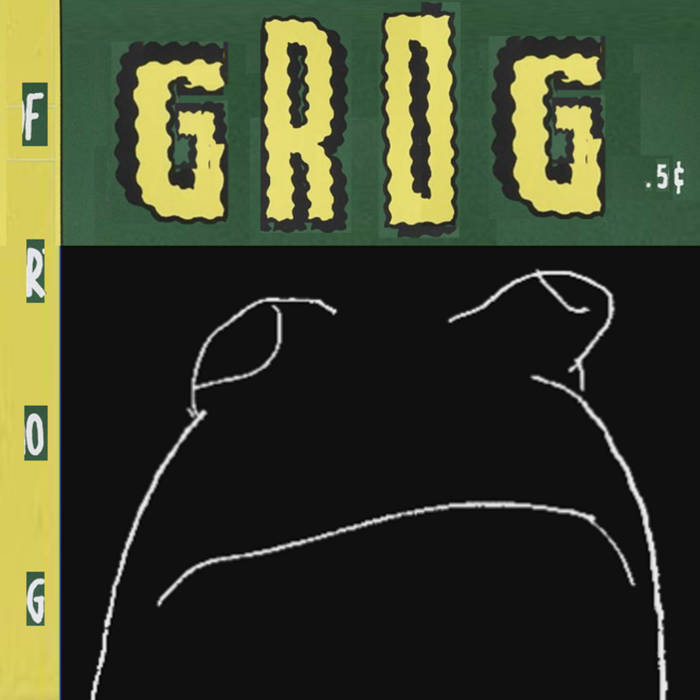Frog – Grog | Album Review
/tapewormies
The sailors survived off rum. Not in the nutritional sense, of course, but in the way one may survive by watching their favorite sports team. Everybody needs a little something to get through the day. The problem arose when the sailors realized they could stockpile their daily rum rations for two, three, four days at a time and then drink themselves silly. Eighteenth-century British naval ships were dangerous operations, and drunk or hungover sailors posed a threat to everybody’s safety. An enterprising admiral named Edward Vernon began mixing fresh water into the rum rations in a 4:1 ratio, shortening the liquor’s shelf life and thus forcing the sailors to consume responsibly. Vernon’s concoction took on his own nickname: Grog, after the grogham cloth he wore around his waist.
Daniel Bateman has always operated in this space, writing fiercely humanist songs under the moniker Frog about the ways in which people mete out coping mechanisms to survive. In the intervening years after 2019’s Count Bateman, his wife gave birth to twins. Faced with the twin specters of newfound responsibility in fatherhood and a pandemic-wracked world, Bateman suddenly found he needed to dig deeper within himself to be able to write and escape into his music; in this regard, it’s fitting that the fifth Frog album is titled Grog, after the beverage which kept the sailors able to focus on the tasks at hand. Grog is, in many ways, a culmination of the greater Frog project: a refinement of the musical and lyrical themes Bateman has pursued his whole career, with fuller arrangements and a bounce that never quite materialized on older records. It also marks the band’s first go-round as a family affair, with Bateman’s brother Steve taking over full-time on drums.
“Goes w/o Saying,” the first proper song on the album, is one in a long tradition of Frog songs that cloaks sexual pursuit in vaguely religious language. But this time, they let the instrumental—a series of chiming pianos—ride out for over a minute after Bateman stops singing until the song starts to sound like hourly church bells collapsing inward on themselves. It’s a new trick for the group, the music now working in greater tandem with the lyrics. Lead single “Black on Black on Black” rides a ferocious stomping groove as Bateman works in abstract notions about Odysseus and Athena. He’s long been obsessed with the modern American myth—2015’s Kind of Blah namechecks Judy Garland, Fred Astaire, MGM, and Patrick Ewing all within a three-song run—but this dive into more classic mythology represents a new frontier. Rather than using pop cultural knowledge as evocative shorthand, he taps into some of the oldest shared cultural knowledge available as a world-building device.
But Grog’s most salient change is Bateman’s status as a new parent. Where his prior character sketches often dealt with fumbling young adulthood in pseudo-autobiography, with all the impulsive drugs and awkward sex that entails, he’s trained his gaze on a younger generation this time around. “420!!” is a melancholy guitar symphony of adolescent shenanigans and early pot-smoking laced with a morbid undercurrent: “You’re gonna die, and yeah, it’s cool / You don’t know why you’re going to school.” It’s a weed-addled bildungsroman in miniature that recalls what its characters are experiencing in real-time: a firmer (and maybe sadder) understanding of the human condition undercut by buzzed euphoria that borders on acceptance. Fatherhood is tackled most explicitly on the tender “Ur Still Mine,” a musing where Bateman imagines talking to a fellow parent before offering words of encouragement to his own kids. “New Ro” lands a bit closer to the Frog songs of prior albums, a bluegrass romp that flashes back to his hometown “where the girls they put out in a car/and the pizza guys know who you are.”
Everything converges on the stunning closer “Gone Back to Stanford,” a bleary vignette about a college underclassman having trouble adjusting to the next phase of her life. Like many of the best Frog songs, “Gone Back to Stanford” is a series of images that stops just short of adding up to a story, littered with asides, non-sequiturs, and foreboding undercurrents. This unnamed person goes to parties and drinks Ketel One and has unfulfilling one-night stands; through it, she’s trying to work up the nerve to tell her mother she wants to transfer out. Bateman fleshes out the scenes beautifully, able to capture the pain and elation and danger of these environments from afar without ever passing judgment; paternal, but never paternalistic. It’s also the most richly arranged song of the band’s career–never before have they been able to execute the kind of drop they pull off at the end with as much heft as they manage here. They bring it home on one of Bateman’s best turns of phrase over his years of writing about lost innocence: “Born in a manger/Going home with a stranger.”










